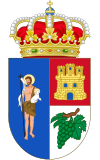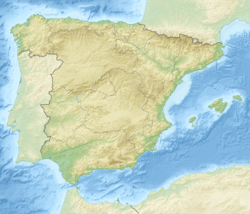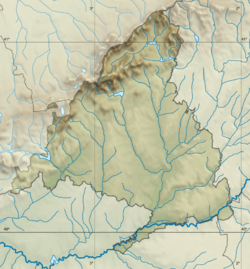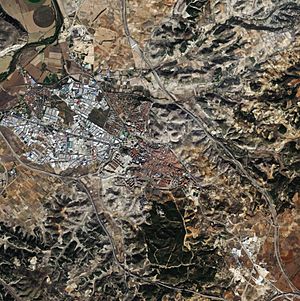Arganda del Rey facts for kids
Quick facts for kids
Arganda del Rey
|
|||
|---|---|---|---|
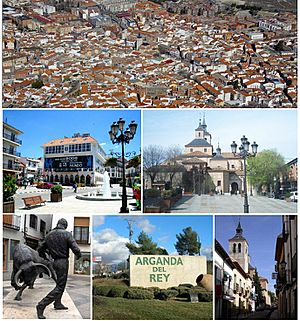 |
|||
|
|||
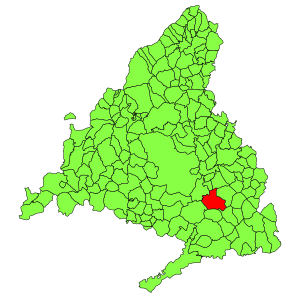
Location of Arganda del Rey in Madrid
|
|||
| Country | Spain | ||
| Region | Community of Madrid | ||
| Government | |||
| • Type | Ayuntamiento | ||
| Area | |||
| • Total | 79.65 km2 (30.75 sq mi) | ||
| Elevation | 618 m (2,028 ft) | ||
| Population
(2018)
|
|||
| • Total | 54,554 | ||
| Time zone | UTC+1 (CET) | ||
| • Summer (DST) | UTC+2 (CEST) | ||
| Postal code |
28500
|
||
| Climate | Csa | ||
Arganda del Rey is a city and municipality in Spain. It is located in the Community of Madrid.
Contents
Exploring Arganda del Rey's Location
This city is in the central part of the Iberian Peninsula. It sits about 613 meters (2,011 feet) above sea level. Arganda del Rey is close to where the Jarama and Manzanares rivers meet.
It is part of the Comarca de Alcalá or Alcarria de Alcalá natural areas. You can reach Madrid from Arganda by metro line 9. Parts of this metro line go above ground and underground outside Madrid.
A Look at Arganda del Rey's Past
Early Beginnings and Roman Times
People once thought the first homes in Arganda were from the Arab period. But archaeological finds show remains from the Roman era. Some language experts believe the name "Arganda" comes from the Latin words area canda. This means "white area."
Ancient Roman writings by Ptolemy mention pre-Roman towns. One of these towns, Alternia, might have been Arganda.
Medieval Times and Royal Connections
In the 11th century, Arganda was home to the king of Spain for 20 years. Christians later took control of the area. However, the population did not grow much until the 14th century. Many historians think the population increased after a big sickness in 1348.
Becoming a Town and Local Challenges
Until 1581, Arganda was part of the archbishopric of Toledo. King Philip II gave Arganda the title of "Villa," which means it became a town. But the town faced money problems.
In 1613, the town was sold to Raul Delgado. The people of Arganda were not happy about this. They protested in an event known as Arganda's Riot.
Growth Through Industry and People
The town grew thanks to its wine industry. A railroad was built in 1843, connecting Arganda to Madrid. In the early 1900s, a sugar factory opened. This started a period of industrial growth and a big increase in people living there.
The Battle of Jarama took place near the town during the Spanish Civil War.
In the 1960s, more industries came to Arganda. This led to another big jump in population. In 1960, about 6,000 people lived in Arganda. By 1981, this number grew to 22,000. Many new residents came from other parts of Spain, like Andalusia and Extremadura. More recently, people from Eastern Europe have moved to Arganda. Today, over 50,000 people live there.
Places to Visit in Arganda del Rey
Historical Buildings to Explore
- Church of San Juan Bautista: This church was built between 1696 and 1714. It mixes different styles like Gothic, Renaissance, and Baroque. It is one of the best-preserved churches in the area. You can even see its front in the movie Viridiana.
- Hermitage of Valtierra: This old religious building is in the former medieval village of Valtierra. It was built in the Mudéjar style in the early 13th century. Today, it is mostly in ruins, but you can still see parts of its walls.
- Hermitage of Vilches: This is a baroque building from the 17th century. Its remains are about 3 kilometers from the center of Arganda.
See also
 In Spanish: Arganda del Rey para niños
In Spanish: Arganda del Rey para niños
 | Janet Taylor Pickett |
 | Synthia Saint James |
 | Howardena Pindell |
 | Faith Ringgold |



